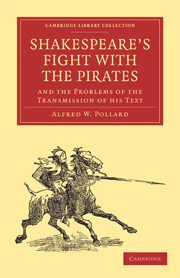AUTHORS, PLAYERS AND PIRATES IN SHAKESPEARE'S DAY
Published online by Cambridge University Press: 07 September 2010
Summary
IN writing on the Regulation of the Book Trade in the Sixteenth Century I claimed that the informal copyright which the Stationers' Company was able to secure to its members in the case of any book duly entered on its register, though it seems to us a poor substitute for a legal copyright vested in the author himself, distinctly increased the market value of the literary wares which an author might have to sell. The publisher, when he was protected from piracy, could afford to pay more than when he was not, and authorship became possible as a profession as soon as printers began to respect each others' rights. That the money received from booksellers was miserably small resulted not so much from their rapacity as from the smallness and poverty of the reading public. Moreover, whether little or much, it was a new income. Before the invention of printing an author was entirely dependent upon patronage for his literary rewards. It took three centuries wholly to supersede patronage, and in Shakespeare's day only about a third of the road had been travelled. The starveling author, Richard Robinson, whose account of his winnings Dr McKerrow unearthed some years ago, sold twenty-five of the twenty-six copies which his publisher gave him instead of cash, as a rule at a shilling apiece. Only once did he obtain as much as forty shillings for the lot.
- Type
- Chapter
- Information
- Publisher: Cambridge University PressPrint publication year: 2010First published in: 1920

